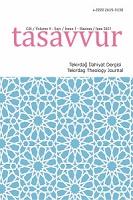Erken Dönem Kûfe’de Mescidlerin Fıkıh Tedrisatındaki Yeri ve Önemi
The Position and Importance of Masjids in Kufa in the Early Period in Fiqh Education
Author(s): Abdullah ÖnderSubject(s): Education, Ancient World, History of Education, History of Islam
Published by: Tekirdağ Namık Kemal Üniversitesi İlahiyat Fakültesi
Keywords: Islamic Law; Fıqh; Education; Mosque; Kūfa;
Summary/Abstract: Throughout the history of Islam, mosques and masjids have been in a position where Muslims both perform their prayers and perform their scientific activities. In this sense, in the history of Islamic culture, Muslims mostly learned and taught sciences such as the Qur'an, tafsir, hadith and fiqh in these places until the spread of madrasahs. Especially the al-Masjid al-Nabawi, which the Muslims built here with their migration from Mecca to Medina, has become a full center of science. People called Companions of Suffa have a great share in this situation. Because they used this place both as a housing and a school. This function of al-Masjid al-Nabawi affected the mosques of cities such as Kufa. With the foundation of Kufa in 17/638, mosques were built in the center and in the quarters of the city. The Companions who came here for different reasons conveyed their knowledge to the public in these mosques. Thus, in the first period the masjids in Kufa became the centers where the Companions conveyed their knowledge of Islamic sciences. Over time, various scientific circles were established in these mosques, and scholars transferred their knowledge of tafser, hadith and fiqh to the next generations. Especially many important jurists were trained in these places. Some of them are ’Alqamah b. Qays, Masruq b. Abdurrahman, Aswad b. Yazīd, Ibrāhīm al-Naḥa’ī, Ḥammād b. Abū Suleimān, Abū Ḥanīfah, Sufyan al-Thawri, Abū Yūsuf and Imam Muhammad. That these important jurists mostly acquired their knowledge of fiqh in the mosques in Kūfa and that some of them had important effects on the formation of the Hanafi sect made important the quantity and quality of the fiqh education in these places. As a result, it has been seen that the masjids in Kūfa have an important role in the raising of many jurists and the function of these places in this regard has been studied. Thus, this study aims to reveal the function of mosques and masjids in the historical process, albeit limited.
Journal: Tasavvur Tekirdağ İlahiyat Dergisi
- Issue Year: 9/2023
- Issue No: 1
- Page Range: 113-144
- Page Count: 32
- Language: Turkish

